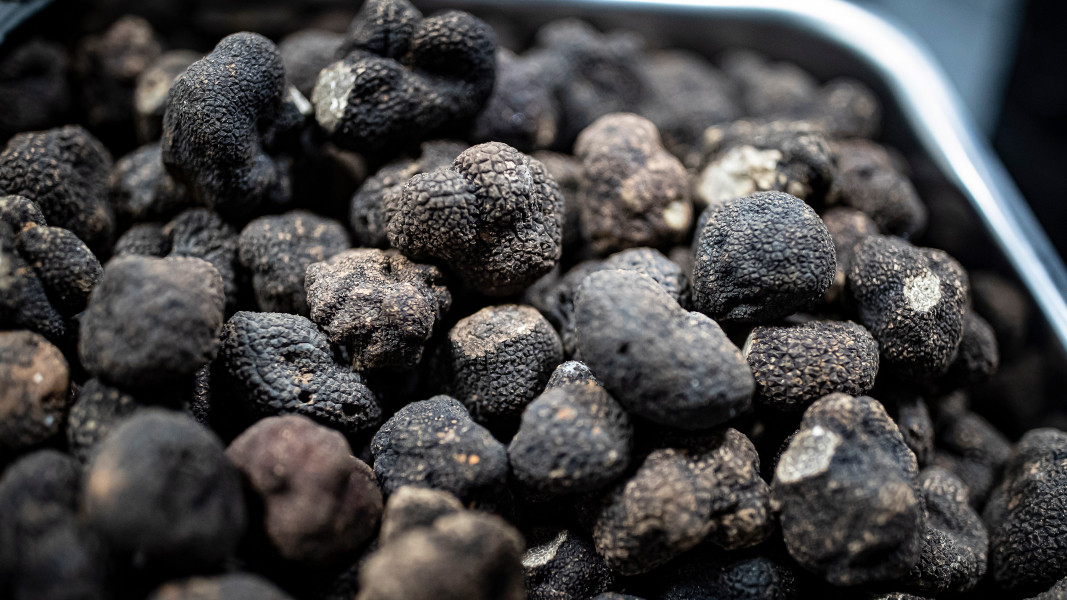Hardly anyone doubts that among the diverse and rich nature of Bulgaria one can find these aromatic mushrooms that are worth a fortune on world markets. Truffles have long been known in Europe as a sophisticated and special addition to dishes with cheese, meat, pasta, etc. Bulgaria emerged on the world map of truffle deposits some 15 years ago, but the country has great potential even for truffle farming. There are no exact statistics on truffle deposits in this country, nor are there any data on the quantities exported per year. The summer truffle is common in all regions of the country. The white truffle, which sometimes reaches exorbitant prices on world markets and can bring great profits to the truffle hunters is less common.
Just like in any craft, one needs patience and persistence, but also a well-trained dog to follow the "tracks" of the fragrant mushroom. It is estimated that there are about 10,000 people involved in truffle hunting in Bulgaria, but their number is not constant, because some give up when price decreases on a global scale. In the country, there is almost no demand for truffles that are considered an expensive delicacy, which is hardly used in the national cuisine. However, sometimes truffle hunters can make decent incomes from collecting truffles.

But most of them, just like treasure hunters, keep their secrets safe. "In this way, truffles are available only to those who are in this craft," Dimitar Dimitrov, chairman of the Bulgarian Truffle Association, tells us. 10 years ago, he became part of the "closed society" almost by accident and thinks that it was high time that the collection of truffles found a place in Bulgarian legislation, because this is the only way to work in a regulated manner:
"Finding truffles, especially of the black summer variety, is no longer unusual in Bulgaria, but interest varies according to the profit potential. The Bulgarian Truffle Association has existed since 2016 as it was established immediately after the biggest rise of popularity of truffle hunting in 2014-2015. Then the number of mushroom hunters rose noticeably. It was a rainy year and there were plenty of truffles to be found. The hunters kept their activities and locations secret. There has not been such a big jump in interest since then, but more and more people know about truffles and hunt for them. No special education is needed for this activity, all kinds of people are involved. Some make a living from the incomes, for others it is just a hobby and an occasion to walk in the forest. All truffles are sold, but the price depends on the demand. Truffles can support a family's budget, but it is almost impossible to count on a permanent income from this activity."
Truffles have always existed in our lands, they are mentioned by ancient Greek authors and they were also used for food by the Thracians. "They were always here but we just didn't look for them," Dimitar Dimitrov says. He recalls that in 2020 MPs from the 44 National Assembly submitted a draft bill for the adoption of a regulatory framework for the trade, collection and storage of truffles. But the people in the association believe that it was not successful because it was written hastily and would only cause obstacles for truffle hunters:

"Our legislation does not mention truffles and there is no support for those wishing to get involved with truffle farming,” Dimitar Dimitrov points out. “In other countries truffle farmers receive large subsidies for initial planting, which cover almost 90% of the initial costs. There is also a 10-year plan to support the plantations, with the first five being the most difficult, because at that time there is no production. There is very serious support in Italy, France, Spain, but in Bulgaria we are far behind their practices".
Photos: BGNES, EPA/BGNES
English: Alexander Markov
With the introduction of the euro on January 1, Bulgaria will benefit from the stability, liquidity and all the advantages of the common currency, European Central Bank President Christine Lagarde said in an interview with public service..
The Ministry of Innovation and Growth has presented the country’s first interactive investment map . The platform aims to provide Bulgarian and foreign investors with useful and up-to-date information in one place, making it easier for them to make..
The Bulgarian state-owed natural gas supplier Bulgargaz has proposed that the price of natural gas for November increases by around 8% to nearly 66 BGN per megawatt-hour, excluding fees and taxes, reported BNR's journalist Yuliana Kornazheva. The..

+359 2 9336 661
